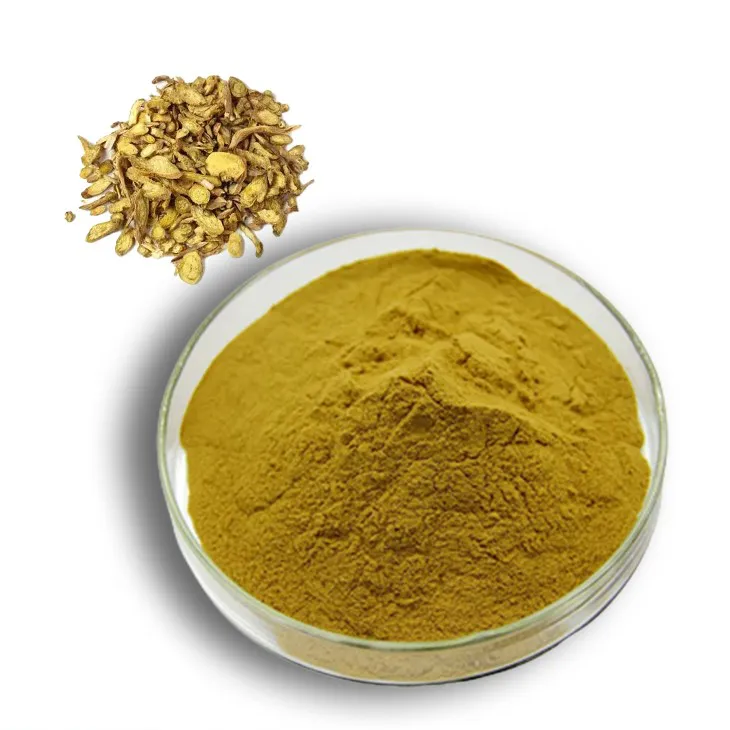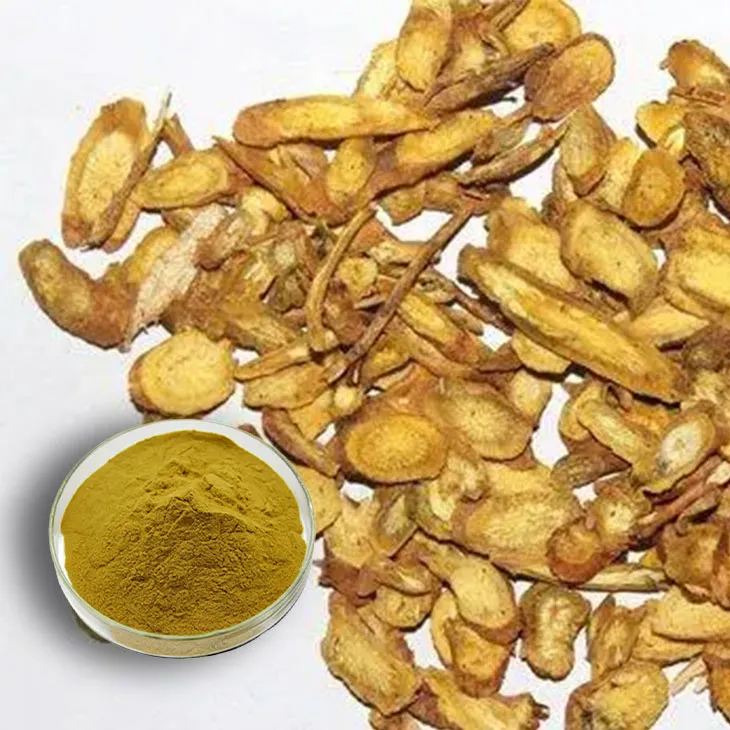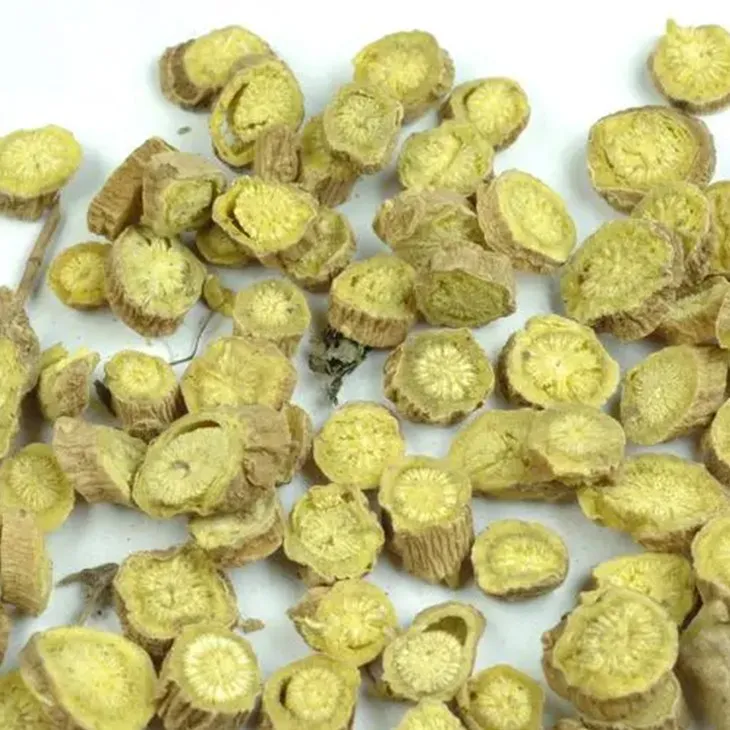- 0086-571-85302990
- sales@greenskybio.com
Baicalin suppliers.
2024-11-26

Introduction
Baicalin, also known as Huangqin Glycoside, is a bioactive compound with remarkable properties. It has been garnering growing attention in the global market. Suppliers of Baicalin play a crucial role in the entire commercial chain. They are responsible for ensuring the availability, quality, and market penetration of this important compound.

Research and Development Capabilities
Meeting the Demand for High - Quality Baicalin
The demand for high - purity and high - quality Baicalin is on the rise. In order to meet this demand, suppliers need to have strong research and development (R & D) capabilities. Firstly, they must explore better extraction methods. Traditional extraction methods may have limitations in terms of efficiency and product purity. Newer techniques such as supercritical fluid extraction or enzymatic extraction may offer advantages. For example, supercritical fluid extraction can often result in a purer product with fewer impurities compared to conventional solvent - based extraction methods.Improving Product Quality
R & D efforts also focus on improving the overall quality of Baicalin. This includes aspects such as chemical stability. Suppliers need to ensure that the Baicalin they produce remains stable during storage and transportation. They may conduct research on the addition of stabilizers or on optimizing storage conditions. Moreover, the physical form of Baicalin can also be optimized through R & D. For instance, producing it in a more easily dissolvable form can enhance its bioavailability.Developing New Applications
Another important aspect of R & D for Baicalin suppliers is the development of new applications. Baicalin has potential in various fields such as pharmaceuticals, nutraceuticals, and cosmetics. In the pharmaceutical field, it may be explored for its potential in treating new diseases or improving the efficacy of existing drugs. For example, research may be carried out to investigate its anti - inflammatory properties in the context of chronic diseases. In nutraceuticals, new product formulations containing Baicalin can be developed, such as dietary supplements targeted at specific health conditions like immune - boosting or anti - aging. In cosmetics, Baicalin may be incorporated into skincare products for its antioxidant and skin - soothing properties. By developing new applications, suppliers can expand the market potential of Baicalin.
Quality Assurance
Establishing a Quality Management System
Quality assurance is a cornerstone for Baicalin suppliers. They need to establish a comprehensive quality management system (QMS). This system should cover all aspects from raw material inspection to the final product testing. For raw materials, suppliers need to ensure that the source of the raw materials is reliable. They should conduct thorough inspections to check for contaminants, proper species identification (since Baicalin is derived from plants), and the quality of the starting materials.Chemical Composition and Purity Testing
One of the key aspects of product testing is the analysis of chemical composition and purity. Baicalin should be analyzed to ensure that it meets the specified chemical standards. High - performance liquid chromatography (HPLC) is a commonly used technique for this purpose. It can accurately determine the concentration of Baicalin in a sample and detect any impurities or related compounds. Suppliers need to set strict purity criteria and ensure that their products consistently meet these standards.Biological Activity Testing
Since Baicalin is a bioactive compound, testing its biological activity is also essential. This may involve in vitro assays to determine its antioxidant, anti - inflammatory, or antibacterial properties. For example, in an antioxidant assay, the ability of Baicalin to scavenge free radicals can be measured. In vivo studies may also be conducted in appropriate animal models to evaluate its efficacy and safety in a more complex biological system. These tests help to ensure that the Baicalin supplied has the expected biological activities and can deliver the promised health benefits.
Market Distribution
Global Perspective
Baicalin suppliers need to adopt a global perspective in market distribution. They cannot solely focus on the domestic market. The global market offers significant growth opportunities for Baicalin. For example, in some Western countries, there is an increasing interest in natural products for health and wellness, and Baicalin can potentially tap into this market. In Asian countries, Baicalin has a long history of use in traditional medicine, and there is also a growing demand for modern formulations containing this compound.Understanding International Regulatory Requirements
To enter international markets, suppliers must understand different international regulatory requirements. Each country may have its own regulations regarding the production, marketing, and safety assessment of Baicalin - containing products. For example, in the European Union, strict regulations govern the use of herbal products in pharmaceuticals and nutraceuticals. Suppliers need to ensure that their products comply with these regulations, which may involve obtaining appropriate certifications or approvals. In the United States, the Food and Drug Administration (FDA) has specific requirements for dietary supplements and drugs.Cultural Differences in Health - care Consumption
Another factor to consider is the cultural differences in health - care consumption. Different cultures may have different attitudes towards natural products and their use in maintaining health. In some cultures, herbal remedies are highly regarded and are the first choice for treating minor ailments. In others, there may be more reliance on modern pharmaceuticals. Suppliers need to take these cultural differences into account when marketing their Baicalin products. For instance, in countries where traditional medicine is deeply rooted, they can emphasize the historical use and traditional knowledge associated with Baicalin. In more Western - oriented cultures, they may focus on scientific research and evidence - based benefits.Building a Good Brand Image
Building a good brand image is crucial for Baicalin suppliers to gain the trust of international customers. A strong brand can differentiate a supplier's products from competitors. Suppliers can achieve this through consistent product quality, ethical business practices, and effective marketing. They can also engage in corporate social responsibility initiatives, such as sustainable sourcing of raw materials or supporting local communities where the raw materials are sourced. This not only enhances their brand image but also contributes to the long - term sustainability of their business.
Supply Chain Management
Raw Material Sourcing
The supply chain of Baicalin starts with raw material sourcing. Suppliers need to ensure a stable and reliable supply of raw materials. This may involve establishing long - term relationships with farmers or collectors who provide the plant sources from which Baicalin is extracted. They also need to ensure the sustainable harvesting of these plants to avoid over - exploitation. For example, if Baicalin is sourced from a particular medicinal plant, suppliers can work with local communities to develop sustainable harvesting practices that protect the plant population and the ecosystem.Production and Processing
In the production and processing stage, suppliers need to ensure efficient and high - quality manufacturing processes. This includes having modern production facilities equipped with appropriate machinery and technology. They need to follow good manufacturing practices (GMP) to ensure product quality and safety. Moreover, they should continuously optimize their production processes to reduce costs and increase productivity. For example, implementing automation in certain production steps can improve efficiency and reduce the risk of human error.Distribution and Logistics
Effective distribution and logistics are essential for getting Baicalin products to the market. Suppliers need to have a well - planned distribution network that can reach both domestic and international markets. This may involve partnering with reliable logistics providers who can ensure timely delivery and proper handling of the products. They also need to consider factors such as cold chain requirements if the Baicalin products are sensitive to temperature. For example, if Baicalin is formulated into a liquid dietary supplement, it may need to be stored and transported at a specific temperature range to maintain its quality.Challenges and Opportunities for Baicalin Suppliers
Challenges
- Competition: The market for bioactive compounds like Baicalin is becoming increasingly competitive. There are many suppliers vying for market share, both from domestic and international sources. To stand out, suppliers need to continuously innovate and differentiate their products. - Regulatory Hurdles: As mentioned earlier, different international regulatory requirements can be a significant challenge. Keeping up with the ever - changing regulations in different countries requires significant resources and expertise. - Price Volatility: The price of raw materials used to produce Baicalin can be volatile. Fluctuations in factors such as weather conditions, which can affect the yield of the plant sources, or changes in market demand can lead to price changes. Suppliers need to manage this price volatility to maintain profitability.Opportunities
- Growing Health Consciousness: The increasing global health consciousness is an opportunity for Baicalin suppliers. Consumers are more interested in natural products for maintaining health, and Baicalin, with its various bioactive properties, can meet this demand. - Research Advancements: Ongoing research on Baicalin is uncovering new potential applications and properties. Suppliers can capitalize on these research findings to develop new products and expand their market. - Emerging Markets: The emergence of new markets, especially in developing countries where the awareness of natural health products is growing, provides opportunities for Baicalin suppliers to expand their business.Conclusion
Baicalin suppliers play a vital role in the commercialization and global dissemination of this important bioactive compound. Their research and development capabilities, quality assurance measures, market distribution strategies, supply chain management, and ability to navigate challenges and opportunities all contribute to the success of the Baicalin industry. By focusing on these aspects, suppliers can not only meet the growing global demand for Baicalin but also contribute to the development and expansion of its market in various fields such as pharmaceuticals, nutraceuticals, and cosmetics.
FAQ:
What are the important factors for Huangqin Glycoside suppliers?
Research and development capabilities, quality assurance, and having a global perspective in market distribution are important factors for Huangqin Glycoside suppliers. For R & D, they need to improve extraction methods and product quality and develop new applications. For quality assurance, a complete quality management system for raw material inspection to final product testing is necessary. In market distribution, they need to meet domestic and international market demands, understand international regulations and cultural differences, and build a good brand image.
How can Huangqin Glycoside suppliers ensure product quality?
Huangqin Glycoside suppliers can ensure product quality by establishing a complete quality management system. This system should cover from raw material inspection to the final product testing, including testing for chemical composition, purity, and biological activity.
Why is research and development important for Huangqin Glycoside suppliers?
Research and development is important for Huangqin Glycoside suppliers because the demand for high - purity and high - quality Huangqin Glycoside is increasing. Through R & D, they can explore better extraction methods, improve product quality, and develop new applications, which can expand the market potential of Huangqin Glycoside.
How can Huangqin Glycoside suppliers explore international markets?
To explore international markets, Huangqin Glycoside suppliers need to have a global perspective. They should understand different international regulatory requirements and cultural differences in health - care consumption. Also, building a good brand image is crucial to gain the trust of international customers.
What challenges might Huangqin Glycoside suppliers face in the global market?
Huangqin Glycoside suppliers might face challenges such as meeting diverse international regulatory requirements, adapting to different cultural differences in health - care consumption, and competing with other suppliers in the global market. They also need to constantly innovate in R & D and maintain high - quality products to stay competitive.
Related literature
- Study on the Extraction and Bioactivity of Huangqin Glycoside"
- "Quality Control of Huangqin Glycoside in the Global Market"
- "The Market Potential of Huangqin Glycoside: A Comprehensive Review"
- ▶ Hesperidin
- ▶ Citrus Bioflavonoids
- ▶ Plant Extract
- ▶ lycopene
- ▶ Diosmin
- ▶ Grape seed extract
- ▶ Sea buckthorn Juice Powder
- ▶ Fruit Juice Powder
- ▶ Hops Extract
- ▶ Artichoke Extract
- ▶ Mushroom extract
- ▶ Astaxanthin
- ▶ Green Tea Extract
- ▶ Curcumin
- ▶ Horse Chestnut Extract
- ▶ Other Product
- ▶ Boswellia Serrata Extract
- ▶ Resveratrol
- ▶ Marigold Extract
- ▶ Grape Leaf Extract
- ▶ New Product
- ▶ Aminolevulinic acid
- ▶ Cranberry Extract
- ▶ Red Yeast Rice
- ▶ Red Wine Extract
-
Garcinia Cambogia Extract
2024-11-26
-
Phyllanthus Emblica Extract
2024-11-26
-
Apricot Powder
2024-11-26
-
Gynostemma pentaphyllum extract
2024-11-26
-
Longan Extract
2024-11-26
-
Selenium yeast
2024-11-26
-
Polygonum Cuspidatum Extract
2024-11-26
-
Licorice Root Extract Powder
2024-11-26
-
Mulberry leaf Extract
2024-11-26
-
Saw Palmetto Extract
2024-11-26





















